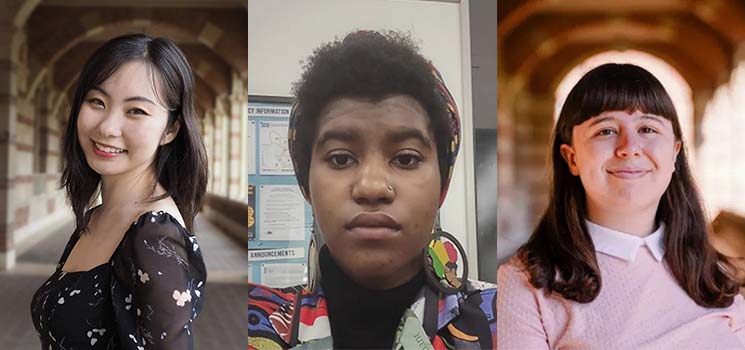2022-23 Marty Sklar entertainment innovation fellows announced

UCLA School of Theater, Film and Television graduate students Taylor S. Goethe (Film, Television and Digital Media) and Marii Yoshida (Theater) as well as undergraduate theater student Zoë Chavez have been chosen by UCLA REMAP as 2022-23 Marty Sklar Entertainment Innovation Fellows. They will be participating in major collaborative projects at REMAP that interweave the physical and digital worlds to share new kinds of stories, as well as training and community-building activities. Design and Media Arts graduate student Don Edler and Urban and Regional Planning graduate student Alejandra Rios have also been named Innovation Fellows.
Now in its second year, the Marty Sklar Entertainment Innovation Fellowship supports high-achieving students with $10,000 each to engage with the legacy and future of themed entertainment. It was made possible by a 2020 leadership gift to UCLA TFT from the family of Martin A. Sklar (1934–2017), a UCLA alumnus widely considered “the Jiminy Cricket of Imagineering,” and funds from the UCLA Chancellor‘s Centennial Scholars Match Initiative.
This year, the fellows will contribute to one of three areas of work at REMAP: the NSF-funded Civic Bicycle Commuting project (CiBiC), which is reimagining bicycle commuting in Los Angeles and integrating ride data and riders’ input into digital media exhibitions of the emerging collective mobility; research, development and prototyping related to the use of augmented reality in live performance and applying it to a new adaptation of a Hugo Award-winning novel (planned for 2023); and the exploration of techniques, applications and ethics of machine learning in the arts, with a focus on one or both of the projects listed above.
During his 53-year career at Disney, Mr. Sklar played pivotal roles in the 1964 New York World’s Fair, the It’s a Small World attraction, Tokyo Disneyland, Disneyland Paris and Disney-MGM Studios, among many others, and upon retirement was honored with a window on Disneyland’s Main Street, U.S.A. His pioneering work in themed entertainment demonstrates how artistic creativity can drive engineering innovation at a large scale, consistent with REMAP’s goals for its research and student experiences.